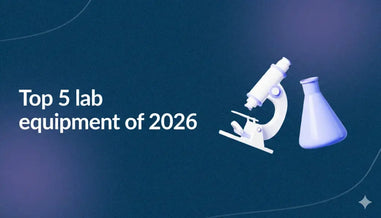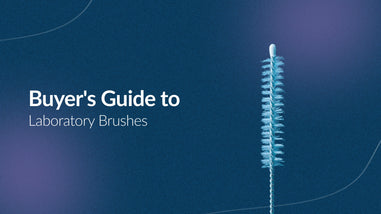- No products in the cart.
In every lab, accuracy starts with the right tools and glassware. Though beakers and flasks look similar, they serve very different purposes. Knowing ‘What is a beaker used for” versus a flask can make the difference between a quick, reliable process and an experiment that needs to be redone.
Beakers are built for mixing, heating, and handling liquids during everyday lab work. Flasks, on the other hand, are made for precision. You use them when you need to measure exact volumes or prevent evaporation during reactions. Choosing the right one affects the safety, efficiency, and compliance in high-standard environments such as biotech, semiconductor, and aerospace labs.
This guide explains the real pros and cons of each, helping you decide which glassware fits your process best:
Key Takeaways
-
Beakers are best for everyday lab tasks like mixing, heating, and transferring liquids.
-
Flasks are designed for precision work such as titrations and solution preparation.
-
Knowing what a beaker is used for helps prevent measurement errors and wasted samples.
-
Beakers offer flexibility and speed, while flasks ensure accuracy and control.
-
Choose glassware based on purpose, qualitative (beaker) or quantitative (flask) work.
-
Proper maintenance, cleaning, and inspection extend glassware life and reliability.
-
Using ISO-tested glassware supports compliance with GLP, GMP, and ISO 17025 standards.
Beakers vs. Flasks

A beaker is open, wide, and easy to handle. It is ideal for mixing, heating, and stirring liquids. It’s what most lab teams reach for when they need a quick, general-purpose container. Knowing “What is a beaker used for?” helps you choose it confidently for everyday tasks like dissolving solids, preparing buffers, or transferring liquids.

Flasks are built for accuracy and control. Their narrow neck helps limit evaporation, reduce spills, and allow more precise measurements. When you need to prepare exact solutions or carry out titrations, the flask is the better choice. It’s also easier to seal, making it safer for reactions or storage.
Together, beakers and flasks cover nearly every step of lab work: one for flexibility, the other for precision.
Why Choosing The Right Glassware Matters In Modern Labs
The glassware you use affects the accuracy and consistency of your results. Choosing the wrong vessel can lead to measurement errors, contamination, or wasted samples. Even a small mistake, such as using a beaker instead of a calibrated flask, can cause a difference in volume. This is enough to ruin a sensitive experiment.
In regulated environments, precision isn’t optional. Labs operating under ISO 17025, GLP, or GMP standards must use certified glassware to ensure reliable data and full traceability. That’s why knowing “What is a beaker used for?” and when to switch to a flask is key to running smooth, compliant workflows.
Lab Pro supports aerospace, biotech, and semiconductor teams with high-quality, ISO-tested glassware that keeps operations accurate, consistent, and audit-ready.
Explore our full selection
Understanding The Beaker: Design, Function, And Use Cases
Design and Material: A beaker is one of the most recognizable pieces of lab glassware. It has a simple, cylindrical body, a flat base for stability, and a wide mouth. These characteristics make it easy to pour, mix, and handle liquids in a beaker. Moreover, they are also ideal for holding samples or transferring liquids during testing. Though they’re not designed for precision measurements, beakers are great for general lab work where flexibility and speed matter more than accuracy. Most beakers include a small spout for clean, controlled pouring without spills.
Usually, beakers are made from BORO 3.3 borosilicate glass, following ISO 3819 standards. This type of glass can handle high heat, sudden temperature changes, and chemical exposure, making it reliable for everyday lab use. It’s durable, easy to clean, and can be reused repeatedly with proper care.
Practical Applications: Beakers are everyday tools in almost every lab. Most teams use them for buffer prep, reagent dilution, and pre-mixing solvents in quality control or research work. Knowing what a beaker is used for helps you pick the right vessel for fast, routine lab tasks that don’t need exact measurements.
Strengths: Beakers are simple, versatile, and affordable. They’re easy to clean, work well with most heating equipment, and fit into almost any workflow. Their open design also makes it easy to add or remove materials quickly.
Limitations: Beakers aren’t designed for high precision. Their graduations are approximate, and their wide mouth means faster evaporation and possible contamination. These make it not the best choice for quantitative work or closed-system experiments where accuracy and containment are critical.

Understanding The Flask: Design, Function, And Use Cases
While beakers are built for flexibility, flasks are made for precision. Their shape, calibration, and sealing options make them essential for analytical and controlled experiments. Knowing when to use a flask instead of a beaker helps you maintain accuracy and consistency across tests and production runs.
Design and Types: Flasks have a conical or round body with a narrow neck, which helps limit evaporation and allows secure sealing with a stopper. This design supports safe swirling, heating, and controlled reactions.
Common types include the erlenmeyer, volumetric, round-bottom, florence, and filtering flasks. Each of these flasks is suited to specific lab applications.
Applications: Flasks are used for solution preparation, titrations, culturing, distillation, and heat-based reactions. Volumetric flasks are calibrated to Class A or B accuracy under ISO 1042 and ASTM E288 standards. They play an essential role in precise measurements in analytical chemistry and quality control.
Strengths: The narrow neck helps reduce contamination and evaporation. The tapered shape ensures smooth mixing and even heat distribution. As the flasks are calibrated, they have accurate and consistent volumes, which is key to reliable data.
Limitations: Yet flasks can be more fragile than beakers. They require careful cleaning, especially in high-volume labs. They’re also more expensive, but their precision and control often outweigh the expense.

Both beakers and flasks are essential in the lab, but their design and purpose set them apart. Knowing what a beaker is used for compared to a flask helps you choose the right tool for your work, whether you’re heating samples, preparing solutions, or storing reagents.

Maintenance, Handling, And Longevity Tips
Taking care of your lab glassware extends its life and keeps your results consistent. A few small habits can prevent contamination, breakage, and inaccurate readings.
Rinse glassware with deionized water after contact with acids or bases to avoid residue buildup.
Avoid sudden temperature changes, as they can cause fractures.
For flasks with narrow necks, use specialized brushes or ultrasonic cleaners to remove residue without scratching the surface.
Before reusing any beaker or flask, inspect for chips or cracks. Even small imperfections can affect accuracy. Store glassware upright and separated by calibration class to prevent mix-ups and damage.
At Lab Pro, we support high-compliance industries like aerospace, biotech, and semiconductor manufacturing with supplies that keep labs running without interruption. Beyond glassware, we offer:
FAQs
What is a beaker used for when working with volatile solvents?
In cases involving volatile solvents, a beaker is typically used for initial mixing or temporary holding while you set up equipment, but you should move the mixture into a sealed flask if you’ll be heating it or storing it. The open mouth of a beaker makes it less suited for evaporation-sensitive tasks, so use it for prep stages, not final reactions.
Can I use a beaker instead of a graduated cylinder for everyday measurements?
While you could use a beaker for rough estimates (especially if you understand what a beaker is used for), graduated cylinders or volumetric flasks are far better when you need precise, traceable results. For routine non-critical tasks, a beaker suffices, but in regulated labs you’ll want a measurement-certified vessel.
What is a beaker used for in a cleanroom or ISO class environment?
In cleanroom or ISO-classified spaces (e.g., ISO 7/8 for semiconductor work), beakers serve well as general workhorse vessels for mixing or buffer prep, provided they meet traceability and material cleanliness standards. If you need high precision or sealed containment, you’ll switch to a flask compliant with calibration and contamination control protocols.
How does the material of a beaker impact its use?
Knowing “What is a beaker used for” includes understanding the materials. Beakers made of BORO 3.3 borosilicate glass resist thermal stress and chemicals better than soda-lime glass or plastic, which is important in high-compliance labs. Using lower-grade materials can compromise your measurement integrity, durability, and compliance readiness.
When should a beaker be replaced or retired in a lab workflow?
Even though you know “What is a beaker used for,” it must still be monitored. Retire a beaker when you see chips, micro-cracks, etched graduations, or signs of fatigue. These defects affect accuracy and safety, especially in regulated workflows where audit traceability is required













































I am looking for a measuring container, clear and marked in cc/grams up to about 200 cc/grams. do you have some thing like that. Thank you, Gary Johnson